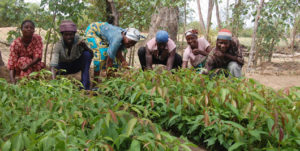Farmers receive training on Ghana Warehouse Receipt system
 More than 150 farmers in the Builsa District have been trained on the concept of the Ghana Warehouse Receipt system to help enhance their performance in the structured trade.
More than 150 farmers in the Builsa District have been trained on the concept of the Ghana Warehouse Receipt system to help enhance their performance in the structured trade.
The training was held separately at Namongsa, Chodem and Chuchuliga in the Builsa district with the objective bringing all farmers, traders and processors on one platform to ensure quality maize and soya beans and to increase productivity and profitability in the grain value chain.
The capacity building training also provided the farmers with skills to assess finance using their grains as collateral from financial institutions.
The training was facilitated by the International Finance Corporation (IFC) represented by Dr. Godwin Kojo Ayenor, a consultant and funded by the Economic Cooperation and Development –SECO and the World Bank.
The trainees are expected to step up best practices in post- harvest handling, enhance market linkages and better bargaining skills after the training to compete in the Ghana commodity exchange platform which is more open, structured and an organised market place.
Madam Akpaalie Akanlingpagya, a participant who spoke in Buli in an open forum reiterated the challenges they faced as farmers annually among which she mentioned post-harvest losses, and lack of standardized pricing.
“We have no bargaining powers and therefore we are always at the mercy of the market agents, who decide what price to offer us.
“Since we send the produce to the market, because of our cash needs, we end up accepting the price that is offered because we cannot carry the head load back home considering the distance from Chodem to Sandema”. Akanlingpagya reiterated.
In her assessment of the training in an interview with the Ghana News Agency after the training, expressed gratitude to the IFC- SECO and the World Bank for the initiative and said the coming into existence of the Ghana Ware House Receipt System, “is a dream come true for women in the district”.
She however called for support by government and other stakeholders to support them with better drying places to avoid the bare ground drying to avoid stones and other livestock from getting in contact with the produce and also called for maize Sheller to improve quality of the grains.
Meanwhile, Abaanlie Azagsuk, also a participant, hoped that as farmers prepared themselves towards the new farming season, the new skills received would enable them move from their current poor income levels to a more improved one.
Ms Azagsuk who spoke with excitement after hearing about the WRS and accompanying benefits said “ I will patronise the WRS this year, when the harvest is ready”.
The training process focused on use of the Warehouse Receipt system (WRS) to obtain standardised market prices, which is being spearheaded by the Ghana Commodity Exchange (GCX) that go through a process of providing price references to enable farmers take decisions on whether to sell or not on produce lodged at the warehouse.
Various rules that prescribe the responsibilities of farmers, traders and the WRS include; ensuring presentation of premium quality grains to qualify for best product grading , observance of appropriate moisture content of produce to avoid spoilage.
The WRS is basic steps that provides proof of depositors and affirm they have certain weight and quality of a certain commodity in a specific warehouse which also provides the depositor access to a bank loan if the receipt is accepted as collateral.
In determining the grains for acceptance at the exchange, some procedures are also followed to ensure cleanliness of the grain, moisture content and insect infestation to avoid grains getting bad during storage.
Other levels of checks are also conducted to determine the grading levels of produce.
Source: GNA
